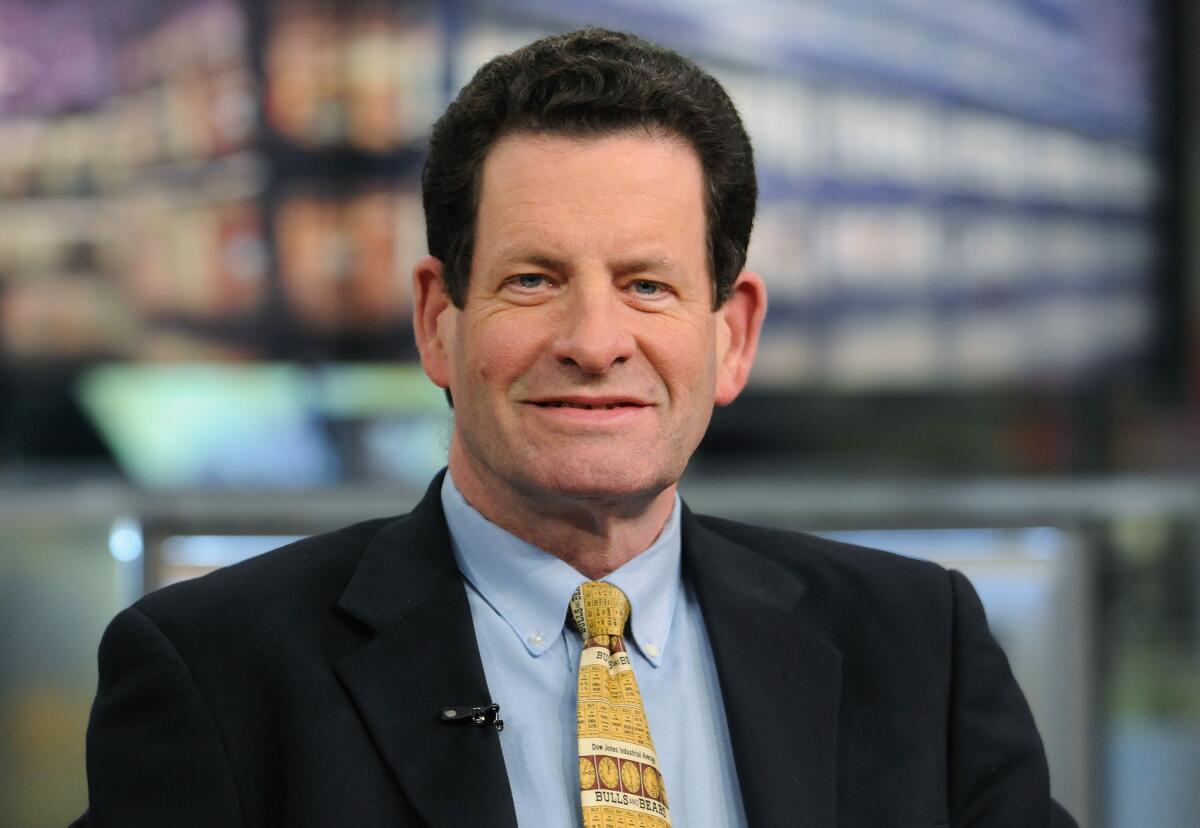Ken Fisher said money managers view winning clients like winning girls. It cost him big

When Alex Chalekian listened to billionaire Ken Fisher at a closed-door investment conference last month mention genitalia and talk about how money managers view gaining clients like “trying to get into a girl’s pants,” the Pasadena financial advisor broke protocol.
He posted a video rant on Twitter titled simply, “I’m truly disgusted.” It went viral.
The resulting outcry over Fisher’s “fireside chat” prompted a formal apology from the notoriously outspoken money manager and caused pension funds to pull billions of dollars in holdings from his Fisher Investments — but not before the 68-year-old investment guru expressed surprise at the backlash, noting candidly he’s talked that way before.
A Fisher spokesman has since complained the remarks were taken out of context, but there was no denying the choice of words — nor the consequences, which marked a rare public accounting for an industry adjusting to the era of Time’s Up and #MeToo.
“I think the older generation of advisors have become numb to this. This has just been the social norm that they’ve been used to,” said Chalekian, 43, in an interview with The Times. “But the younger advisors, this is not something they are used to. They want to speak out. They are utilizing Twitter or other social media platforms to voice their concerns.”
Sexism has long been seen as an intractable problem in finance, especially for older generations who witnessed previous scandals that didn’t bring about broad changes in the industry’s male culture, born out of a workplace that was largely closed to women well into the postwar era.
Just how toxic that workplace could be was publicly documented when female workers at a Long Island brokerage office led a 1996 sex discrimination and harassment lawsuit against Smith Barney that inspired a book called “Tales From the Boom-Boom Room,” — replete with strippers, a condom in a pneumatic tube and other improprieties directed at women.
And if the disturbing film “The Wolf of Wall Street” about a testosterone-driven 1990s boiler-room operation served as a reminder, the ouster two years ago of Mike Cagney as chief executive of online start-up Social Finance Inc. for fomenting an atmosphere that enabled sexual harassment showed just how ingrained that culture is.
Still, the SoFi story didn’t provoke the public backlash caused by Fisher’s comments, with the behavior at the fintech firm happening behind closed doors. It also broke a month before the New York Times and the New Yorker published their groundbreaking Harvey Weinstein articles, which started a public conversation about how men were expected to conduct themselves at work.
And while it’s questionable just how much even the entertainment industry has been transformed — given how many improprieties are still hidden by nondisclosure agreements commonplace across corporate America, including the finance sector — this much is certain: There are some things financiers can no longer say in public without repercussions.
“These types of comments are obviously very inappropriate and have no place in today’s workplace or society,” said Raymond Ciranna, general manager of Los Angeles Fire and Police Pensions, which voted to withdraw about $510 million it had given Fisher’s firm to manage.
Sallie Krawcheck, who served as chief financial officer at CitiGroup last decade, said the response to Fisher’s comments may be a signal that some progress has been made in the industry.
“Is this a #MeToo moment? Let’s hope so,” said Krawcheck, 54. “I think [Fisher] looked out at an audience that — as so many audiences have been over the course of his career — is mostly like him and that there wasn’t a recognition that the times have moved along. The whole thing is just creepy.”
Or at the minimum tone deaf, considering Fisher has been a ubiquitous presence in the business media, written books and penned a Forbes column for decades until 2017. It also comes just months after the business world was deluged with sordid stories about Jeffrey Epstein, the 66-year-old wealthy money manager who cavorted with business elites and was accused of sex trafficking before he committed suicide in August in his Manhattan jail cell, according to a coroner.
Dismiss “The Wolf of Wall Street” and “Boom-Boom Room” as outliers, but nearly 2,000 women joined the Smith Barney class-action lawsuit, and Krawcheck, who long worked at blue-chip Wall Street firms, recalls her own set of cringe-worthy tales from earlier in her career.
“Some of it I hope is in the rearview mirror — having copies of male genitalia left on my desk, leaning over and having a guy pretend to have sex with me behind my back,” said Krawcheck, who has since co-founded Ellevest, an investing platform for women.
Krawcheck said that as she moved up in the industry, the sexism never really stopped. It just became more subtle. “Then it was, ‘Sallie, your profile is too high,’” she said. “The business results are good, you get good press, but you are in trouble for the good press?”
Kristin Hull, founder of Nia Impact Capital, an Oakland-based fund that invests in companies with women in key leadership roles that address societal challenges, said subtle sexism is still pervasive in the industry.
Hull, 52, who serves as the firm’s chief executive and chief investment officer, has a master’s degree from Stanford University and a doctorate from UC Berkeley, both in education. Yet, she said, she is “dismissed” and has to endure “mansplaining” constantly.
“So people say, ‘Yes, you have been outperforming, but fossil fuels have been down for the last four years. Don’t you think you just got lucky?’ — basically dismissing my whole investment thesis as luck whereas if it were a man I am confident that they would have said, ‘You are a genius to have predicted this early,’” she said.
Hull blames much of the slow progress in the investment industry on the small number of women who are managing money. “If you were to ask somebody how many women are asset managers, or how many women are wealth managers, people might say, ‘Oh yeah, there’s fewer,’ but no one is going to say it’s fewer than 5% of our entire economy is run by women,” she said, noting a recent Knight Foundation study.
The results of the study, broadly consistent with Morningstar research, found that firms owned by women and minorities manage just 1.3% of the assets in the $69-trillion U.S. asset management industry even though they perform just as well if not better than their competitors.
Much of the focus on how to eliminate sexism and bias from the financial industry has focused on driving up the numbers of women in the field, an approach hindered by the low numbers of women who enter it in the first place.
Brad Barber, a professor at the UC Davis Graduate School of Management, coauthored a series of studies that examined why there are so few women in finance, including fewer than 20% of the more than 150,000 Chartered Financial Analysts worldwide, even as female labor force participation has grown.
The studies found that women who have mothers who worked in science, technology or another STEM field were much more likely to enter the profession. Another study found that a math gender gap detected in middle school also is correlated to women deciding not to go into finance, but that the gap is not universal across countries, indicating cultural factors are at play.
One conclusion to draw from the studies is that women need to be encouraged in math and to pursue finance — but that requires a change in cultural attitudes. “It’s a bit of a chicken-and-egg problem,” Barber said. “We have been making progress as a society, but there is more work to be done.”
The Forte Foundation, a nonprofit consortium of corporations, universities and MBA programs aimed at increasing the number of women who choose business careers, follows a practical approach. Its programs help female undergraduates conduct career exploration, choose courses and pursue internships.
“All of those things that seem to happen somewhat organically for young men have to be built in the formal infrastructure for women, for people of color, for first-generation college students,” said CEO Elissa Sangster, a former assistant dean of the MBA program at the University of Texas at Austin business school.
The foundation promotes mentoring of undergraduates, an approach endorsed by Barber to overcome cultural attitudes that direct women away from finance.
Sangster said that Wall Street firms have made gains with their MBA hires, with recruiters telling her that new recruiting classes are 40% to 50% female, but that only represents partial progress because retaining them is another matter.
“Almost from the very beginning that pay gap starts and the promotion gap starts. And the supervisor responsibility gap starts. And so you see women supervising two people and men supervising six. And even after the MBA you start seeing that gap happen. Trying to address those inequities that occur early on in these women’s careers is also critical,” she said.
Anne Vladek, a New York attorney who specializes in discrimination, sexual harassment and other employment matters, said her firm regularly handles cases for women on Wall Street. She said that whereas cases involving egregious frat-house behavior may have faded, discrimination has not.
“Leads, assignments, expense budgets — it’s the kind of discrimination where they try to be more subtle,” she said. “It’s a little more sophisticated. I actually don’t think we have come a far way from where we have been.”
Sangster said another tool that the Forte Foundation promotes is its male ally program, which encourages men to step forward to challenge a culture that in the financial services industry has created a “leaky pipeline” for women. She said the decision by Chalekian to disclose what Fisher said is one of the best examples.
“We need those who have power already to step forward and say, ‘I find this unacceptable,’ and I think we need to call it out wherever we see it,” she said.
It’s estimated that public pension funds have pulled more than $3 billion from Fisher Investments, which has declined to comment on the total amount of withdrawals. But in an Oct. 25 open letter to the Camas community in Washington where his money-management firm is based, Fisher said the “several billion dollars” in withdrawals would not result in any layoffs at the firm.
Fisher, founder and chairman of his company, noted that such holdings account for less than 10% of the firm’s assets under management and have been more than made up for by gains in other asset classes, which include high-net-worth investors and business 401(k) accounts. The firm reported more than $112 billion under management as of Sept. 30.
Fisher, who has an estimated net worth of about $4 billion, has promised never to make such remarks again and in his open letter defended his firm’s track record, saying it is diverse and 85% of employees report to executive vice presidents who are “women, people of color and/or identify as a member of the LGBTQ community.”
He’s also hit back with full-page newspaper ads highlighting female employees and touting the firm’s commitment to them. John Dillard, the firm’s head of global public relations, issued a statement to The Times complaining that the media have distorted and taken Fisher’s remarks out of context.
“Any fair account of those remarks would acknowledge that Ken used the language he did to underscore how some advisors and brokers behave in pushing their services on prospective clients. Given most people’s privacy about their financial life, aggressive sales pitches are the equivalent of a crude come-on in a bar. His point was, that’s no way for a financial advisor to behave,” he said.
Nevertheless, the analogy that Fisher chose to draw has got him banned from participating in future Tiburon CEO Summits by the wealth advisory firm that runs the conference, which posted an open letter about the remarks. Managing partner Charles Roame wrote that Chalekian technically violated the conference’s no-media policy with his Oct. 8 tweet but added that he “should be commended for having the strength to go public Tuesday night with his views of offensive behavior.”
Chalekian, founder of Lake Avenue Financial, a six-person registered investment advisor that is half women, said he has mostly had positive messages, phone calls and emails in response to his tweet. He hopes it will spur change not only in the financial services industry but in other fields too.
“Gone are the days of shaming others for speaking out. The younger generation knows if they see something wrong they’re going to speak up. When I started in the industry in 1997 a lot of this was water cooler talk. You would talk to some other advisors or brokers near the water cooler and talk about what happened and then the story would die right there,” he said.







